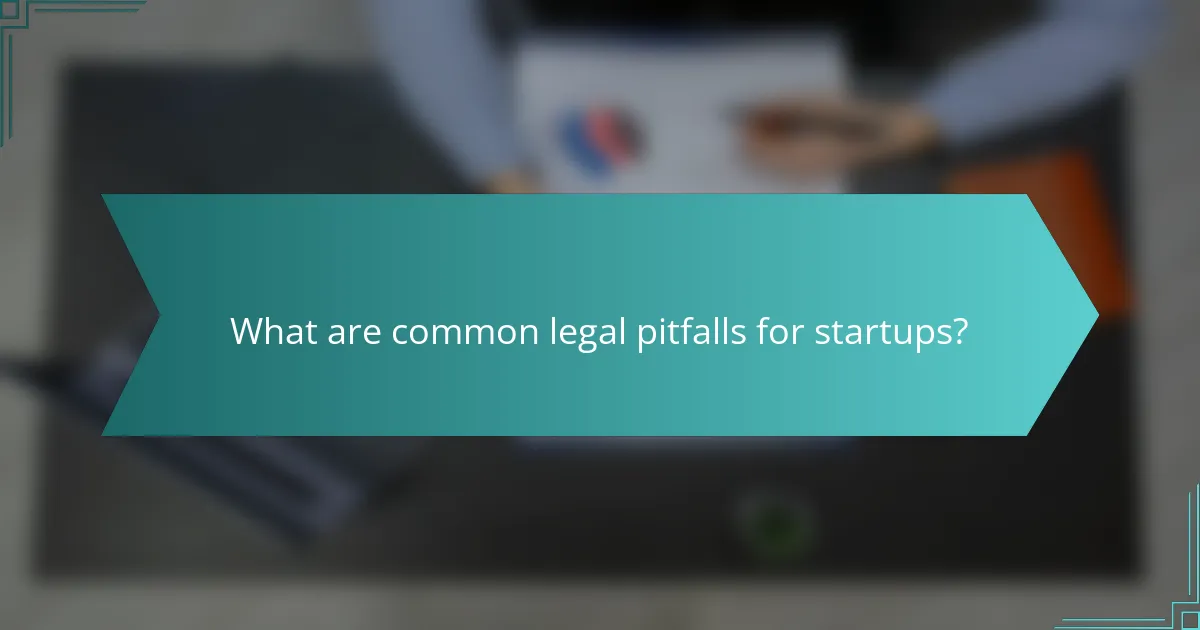Legal pitfalls present significant challenges for both individuals and businesses, ranging from contractual disputes to regulatory compliance failures. Recognizing these risks is essential to avoid serious consequences, such as financial penalties and reputational damage. By implementing proactive measures and ensuring adherence to legal standards, organizations can effectively mitigate potential legal issues.

What are the legal risks in the UK?
Legal risks in the UK encompass various challenges that individuals and businesses may face, including contractual disputes, regulatory compliance failures, and intellectual property infringements. Understanding these risks is crucial for mitigating potential consequences and ensuring adherence to the law.
Contractual disputes
Contractual disputes arise when parties involved in an agreement fail to meet their obligations, leading to disagreements over terms or performance. Common causes include vague contract language, misunderstandings, or unmet deadlines. Businesses should ensure contracts are clear and comprehensive to minimize the risk of disputes.
To avoid contractual issues, consider implementing a review process before signing agreements. This may involve legal counsel to identify potential pitfalls and clarify obligations. Regular communication with all parties can also help address concerns before they escalate into disputes.
Regulatory compliance failures
Regulatory compliance failures occur when businesses do not adhere to laws and regulations applicable to their industry. In the UK, this can involve various sectors, including finance, healthcare, and data protection. Non-compliance can lead to significant penalties, including fines and reputational damage.
To mitigate compliance risks, organizations should stay informed about relevant regulations and establish internal policies to ensure adherence. Regular audits and training for employees can help maintain compliance and identify potential areas of concern early on.
Intellectual property infringements
Intellectual property infringements involve unauthorized use of protected creations, such as trademarks, copyrights, or patents. In the UK, these infringements can lead to legal action and financial penalties. Businesses must be vigilant in protecting their intellectual property and respecting others’ rights.
To avoid infringements, conduct thorough research before launching new products or services. Registering trademarks and copyrights can provide legal protection, while monitoring the market for potential violations can help safeguard your intellectual property. Engaging legal expertise can also assist in navigating complex IP laws effectively.

What are the consequences of legal pitfalls?
Legal pitfalls can lead to serious consequences that affect individuals and organizations alike. These consequences often include financial penalties, damage to reputation, and the potential for legal action or litigation.
Financial penalties
Financial penalties are one of the most immediate consequences of legal pitfalls. These can range from fines imposed by regulatory bodies to substantial settlements in civil lawsuits. Depending on the severity of the infraction, penalties can vary widely, often reaching thousands or even millions of dollars.
Organizations should be aware of the potential for ongoing costs, such as increased insurance premiums and legal fees, which can add to the financial burden. To mitigate these risks, consider implementing compliance programs and regular audits to identify and address potential issues before they escalate.
Reputation damage
Reputation damage can have long-lasting effects on both individuals and businesses. A negative public perception resulting from legal issues can lead to loss of customers, decreased sales, and challenges in attracting new clients or partners. This damage can take years to repair, affecting long-term growth and sustainability.
To protect your reputation, proactive communication is key. Address issues transparently and promptly, and consider engaging public relations professionals to manage the narrative. Building a strong brand reputation through consistent ethical practices can also help mitigate the impact of any legal pitfalls.
Legal action and litigation
Legal action and litigation are serious consequences that can arise from legal pitfalls. This can involve lawsuits filed by individuals, organizations, or government entities seeking damages or enforcement of regulations. The litigation process can be lengthy and costly, often diverting resources away from core business activities.
To avoid litigation, it is crucial to seek legal counsel when navigating complex regulations or contracts. Regular training for employees on compliance and legal obligations can also reduce the likelihood of disputes escalating to legal action. Establishing clear policies and procedures for addressing grievances can further help in resolving issues before they lead to litigation.

How can businesses mitigate legal risks?
Businesses can mitigate legal risks by implementing proactive measures that ensure compliance with laws and regulations. This involves establishing clear policies, conducting regular assessments, and providing adequate training to employees.
Implementing compliance programs
Compliance programs are structured frameworks that help businesses adhere to legal standards and industry regulations. These programs should include clear guidelines, regular updates, and mechanisms for reporting violations.
To be effective, a compliance program should be tailored to the specific risks associated with the business’s operations. For example, a financial institution may focus on anti-money laundering regulations, while a healthcare provider must prioritize patient privacy laws.
Regular legal audits
Conducting regular legal audits allows businesses to identify potential legal risks and ensure compliance with applicable laws. These audits should assess various aspects of the business, including contracts, employment practices, and regulatory compliance.
Audits can be performed internally or by external legal experts. It is advisable to schedule these audits at least annually to stay ahead of any legal changes and to address issues before they escalate into serious problems.
Training staff on legal obligations
Training employees on legal obligations is crucial for minimizing legal risks. Staff should be educated about relevant laws, company policies, and the consequences of non-compliance.
Effective training programs can include workshops, online courses, and regular updates on legal changes. Businesses should ensure that all employees, especially those in sensitive positions, receive this training to foster a culture of compliance and accountability.

What are the best practices for contract management?
Effective contract management involves clearly defined processes and regular oversight to minimize risks and ensure compliance. Implementing best practices can help organizations avoid legal pitfalls and enhance operational efficiency.
Clear terms and conditions
Establishing clear terms and conditions is essential for effective contract management. This includes specifying obligations, rights, and penalties for non-compliance, which helps prevent misunderstandings and disputes. Use straightforward language to ensure all parties fully comprehend their responsibilities.
Consider including key elements such as payment terms, delivery schedules, and confidentiality clauses. For instance, a payment schedule might outline specific dates and amounts, reducing ambiguity and potential conflicts.
Regular reviews and updates
Conducting regular reviews and updates of contracts is crucial to adapt to changing circumstances and legal requirements. Schedule periodic assessments to ensure that contracts remain relevant and compliant with current laws and regulations.
During these reviews, check for any expired terms or clauses that may need modification. For example, if market conditions change, it may be necessary to renegotiate pricing terms to reflect current realities.
Use of legal templates
Utilizing legal templates can streamline the contract creation process and ensure consistency across agreements. Templates provide a solid foundation that includes standard clauses and provisions, reducing the risk of overlooking critical elements.
However, it’s important to customize templates to fit specific agreements and avoid generic language that may not apply. Regularly update templates to reflect changes in laws or best practices, ensuring they remain effective and compliant.

How to choose a legal advisor in the UK?
Choosing a legal advisor in the UK involves evaluating their expertise, client feedback, and fee structures. A well-informed decision can help you navigate legal challenges effectively and avoid potential pitfalls.
Assessing expertise in relevant law
Start by identifying the specific area of law you need assistance with, such as family law, commercial law, or criminal law. Look for advisors who specialize in that field, as they will have the necessary knowledge and experience to handle your case.
Check their qualifications, such as membership in professional bodies like the Law Society or Bar Council. Additionally, consider their track record with similar cases, as this can provide insight into their capability and success rate.
Evaluating client testimonials
Client testimonials can offer valuable insights into a legal advisor’s effectiveness and approach. Look for reviews on their website, legal directories, or independent review platforms to gauge client satisfaction.
Pay attention to feedback regarding communication, responsiveness, and overall experience. A legal advisor with consistently positive testimonials is more likely to provide a satisfactory service.
Understanding fee structures
Legal advisors in the UK may charge fees in various ways, including hourly rates, fixed fees, or contingency fees. Understanding these structures will help you anticipate costs and avoid unexpected expenses.
Request a clear breakdown of fees upfront and inquire about any additional costs, such as court fees or administrative charges. Comparing fee structures among different advisors can help you find a service that fits your budget while ensuring quality representation.

What are common legal pitfalls for startups?
Startups often face several legal pitfalls that can jeopardize their operations and growth. Common issues include inadequate business structures and neglecting employment laws, both of which can lead to significant financial and legal consequences.
Inadequate business structure
Choosing the right business structure is crucial for startups, as it affects liability, taxes, and operational flexibility. Common structures include sole proprietorships, partnerships, LLCs, and corporations, each with distinct legal implications.
For example, a sole proprietorship may be easier to set up but exposes the owner to personal liability. In contrast, an LLC provides limited liability protection but involves more regulatory requirements. Startups should evaluate their needs and consult legal experts to select the most suitable structure.
Neglecting employment laws
Compliance with employment laws is essential for startups to avoid costly legal disputes. This includes understanding regulations related to hiring, wages, workplace safety, and employee rights. Failing to adhere to these laws can result in penalties and lawsuits.
Startups should implement clear hiring practices, maintain accurate records, and ensure compliance with local labor laws. Regular training on employee rights and workplace policies can also help mitigate risks. Engaging with a legal advisor can provide guidance tailored to specific business needs and local regulations.










